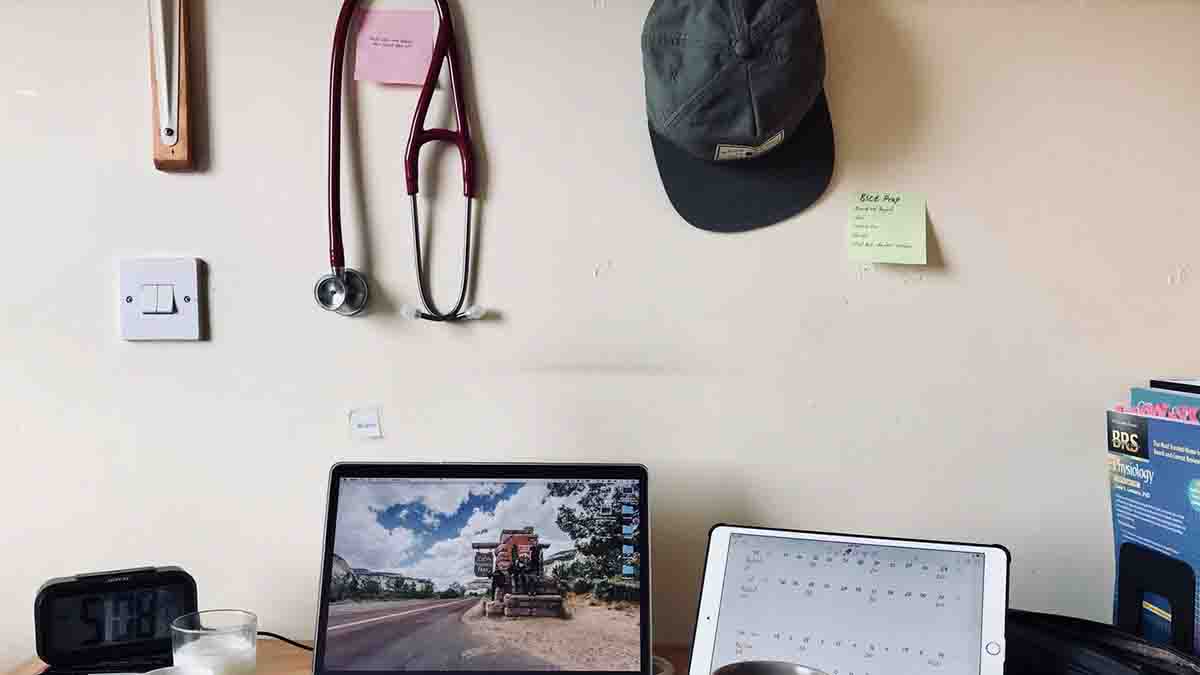Before starting Medical School: You have passed all the exams you need to get into medical school and now, you are ready and packing for school.
What are the things you need to buy before starting medical school or Medical school Essentials?
Do you have to carry your entire closet to school? No, it’s not that way. There are important materials and instruments you need that distinguish you as a medical student.
It’s important to remember that medical students and medical colleges are not the same. Some medical students will undoubtedly lack up to half of the medical school.
On the other side, there are some medical students who have everything and are making good use of it. Also, because of the cost, some medical schools may not be as strict as others in ensuring that every medical student has all of these needs.
They do not, however, ignore the most fundamental items used in clinics, such as stethoscopes, lab coats, diagnostic tools, and so on.
Medical students attending a private medical school, on the other hand, may be required to purchase all of the required medical school supplies.
Medical School Essentials:
1. Academic Materials:
- Study Notes
- Medical Text Books
- Backpack
- Stationery
- Tape
- Staple
- Permanent marker
- Portfolio
- A4 papers
- Photocopying machine
- Smartphone
- Earpiece
- Harddrive
- White Lab coats
- Stethoscope
- Ergonomic chair
- Sphygmomanometer
2. Dorm Materials:
- Trousers
- Shirts
- Long sleeves
- Short sleeves
- Suit
- Black shoes
- Sandals
- Underwears
- Hangers
- Bed lamp
- Blanket
- Bed sheets
- Pillow
- Alarm clock
- Under bed storage
- Table
- Chair
- Side Stool
- Book rack
- Professional attire
Medical School Essentials:
3. Room Cleaning Materials:
- Broom
- Mob
- Trash can
4. Health needs/ Materials:
- Aspirin
- Paracetamol
- Doctor’s report
- Condom/Pill
- Anti-allergy pills
Top Medical School Essentials:
5. Laptop:
The laptop is by far the most significant investment, especially if you’re going to medical school, which is why it’s at the top of the list of medical school essentials.
Make sure you pick a decent, quality laptop because you will be studying and working on it for hours.
Several classes in medical school will need you to bring your laptop to participate in interactive learning sessions, and you will be obliged to do so throughout your education.
6. Tendon hammers:
Tendon hammers are used in clinical neurological exams, upper and lower limb exams, and more.
You’ll be expected to use them early on. It’s advisable to suggest choosing one that’s tiny enough to fit in your bag, as you’ll need it at unexpected moments.
Some may get by without one while in medical school, but having one once you graduate will save you a lot of time.
It takes time to search for a tendon hammer on the hospital wards, and much more time to wait for a colleague to complete using the shared tendon hammer.
Read more:
- Top 5 Best Medical Schools in New Jersey
- 10 Best Doctor of Osteopathic (DO) Medical Schools in the US
- 5 Best Medical Radiography Schools In Nigeria (FAQs)
- Is Biomedical Engineering Hard? (FAQs)
- Is Biochemistry a Good Major for Medical School? (FAQs)
7. School Bag:
Even if you spend most of your pre-clinical years studying at home and avoiding lectures, you will eventually find yourself on the go as a medical student.
Taking care of your belongings while you transition from home to hospital and return is critical.
You don’t want to have to pay again for lost or damaged equipment. Equally important is comfort and avoiding straining your back while transporting your belongings.
Backpacks such as these ones are great for medical school.
8. Stethoscope:
A stethoscope is a medical tool used to listen to sounds inside the body, mostly from the heart and lungs.
There is no doubt that a stethoscope is required for every medical student in the world. Only question is, do you require a very excellent one, or do you only require a good-enough one, to begin with?
It is entirely up to you to decide whether or not to invest right away. Some believe that unless you start with a high-quality stethoscope from the beginning, your auscultation skills would be hampered; others disagree.
9. Scrubs:
Scrubs will be required frequently during your first year. Scrubs were necessary for anatomy lab, shadowing, and student-run clinics.
While excellent scrubs are an option, we recommend starting with a pair of inexpensive scrubs (especially for the anatomy reek of formaldehyde after lab).
In some places, like the operating room, you might be mandated to wear medical scrubs. Some students will only wear hospital scrubs throughout medical school.
10. First Aid box:
First aid is emergency care given to anyone suffering from a minor or major disease or injury, with the goal of saving lives, preventing further harm, or promoting recovery. The contents include:
- Gloves/Eye Protection.
- Roller Gauze.
- CPR Pocket Mask.
- Two Triangular Bandages.
- Sam Splint.
- Tourniquet.
- Medical Tape.
11. Sphygmomanometer:
A sphygmomanometer is an instrument used to measure blood pressure.
As a medical student, the process of learning to take your blood pressure is likely the first clinical skill you acquire while in medical school, and it is one that will be assessed in clinical exams every single year until you graduate from medical school.
It is far more likely that you will achieve perfection if you have your own Sphygmomanometer at your disposal. Practice at home on any willing subject you can think of.
Your total performance on your clinical examinations will be improved the sooner you are able to take an exact and precise blood pressure reading.
Read more:
- Top 7 Best Pre-Medical Schools in California
- Do Medical Students Get Paid? (FAQs, Online Money)
- Is Dental School Harder Than Medical School? (FAQs)
- How To Request For A Medical School Letter Of Recommendation
12. Fashionable Wardrobe shoes:
This is one that only a few people are prepared for, but they pick up on pretty quickly.
Over the course of medical school, and particularly in the beginning, you’ll find yourself onwards or in clinics doing nothing except hanging around and watching what’s happening.
13. Ophthalmoscope:
In order to detect and evaluate indications of retinal detachment or eye illnesses such as glaucoma, an ophthalmoscope is utilized.
For example, you may never need to use a stethoscope again depending on the specialization you choose to follow after your undergraduate degree. Instead, invest in a reliable and simple-to-use ophthalmoscope.
14. White labcoats:
Lab coats are worn in the laboratory to prevent accidental spills of potentially hazardous materials such as acids.
In this situation, they are often long-sleeved and composed of absorbent material, such as cotton, to ensure that the user is shielded from the chemical.
Frequently Asked Questions on starting Medical School
Applying to medical school is not like applying to any other kind of institution; there is no specific timeline you must follow. People of all ages, from 20 to 50, have been known to fill out applications. When you’ve prepared yourself well for the rigors of medical school and are confident in your application’s chances of getting accepted, then you should apply.
It’s hard to get into medical school. The Association of American Medical Colleges has put together data that shows the national acceptance rate is 43%.
It’s likely that a general practice doctor is the most accessible medical specialty. The minimum requirements for becoming a doctor are four years of college, plus an additional year or two spent in residency.
Medical school is a very hands-on and memorize-heavy experience. Studying law needs lots of thought and analysis. While clinical studies and hands-on training in medicine are essential, in law school, students must devote significant time to reading and writing.
Conclusion:
So you’ve made it into medical school with flying colors? Alternatively, you may have graduated from medical school but would like to know what medical students at other institutions are using.
Before starting medical school, there’s a lot of crap that gets recommended by “influencers” who are recommending what they think you should buy. They make the mistake of assuming you have limitless financial resources.
Awesome one; I hope this article answered your question.
Editor’s Recommendations:
- 9 Best Alternatives To Grad School (FAQs)
- How To Become A Child Psychiatrist (FAQs, Schools)
- How To Become A Doctor In Canada From Another Country (FAQs)
- 5 Most Beautiful Medical Schools (FAQs)





